#Devops career path
Explore tagged Tumblr posts
Text
What Jobs Go into DevOps: Key Roles in DevOps | OpsNexa!
Discover the many roles in DevOps and how they contribute to the success of modern software development and IT operations. This article delves into the roles that make DevOps work, What Jobs Go into DevOps, the skills needed for each function, and how professionals interact to deliver high-quality software efficiently. Learn about the various job prospects in DevOps, whether you're just getting started or looking to make a change.
#Devops job roles#Devops career path#Devops positions#Devops team structure#careers-in-devops#Devops engineer roles#Devops skillset#Devops career guide
0 notes
Text
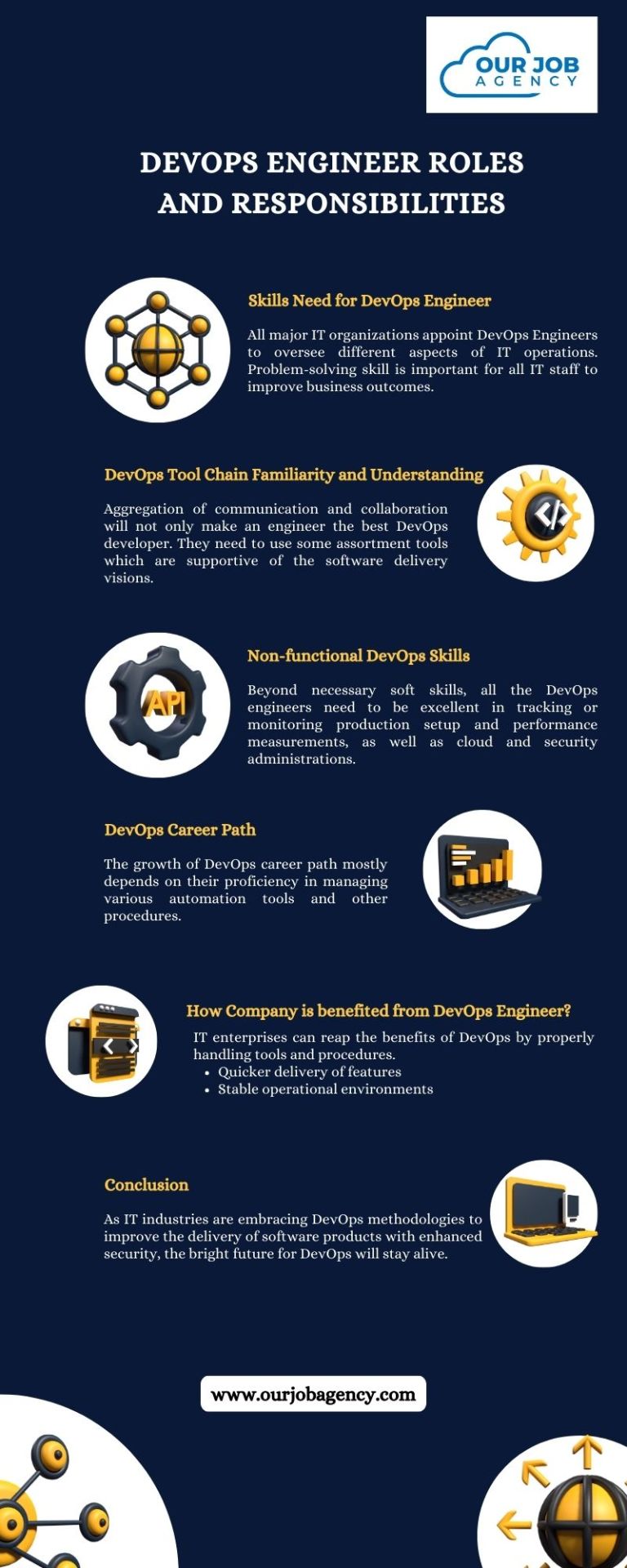
DevOps is a collaborative methodology, which connects the development and operations teams of an IT company to increase its productivity. Today, each recognized IT company creates a role of DevOps Engineer or developer to make the IT processes so cool and good.
#devops engineer roles and responsibilities#devops engineer role description#devops career path#devops engineer career path#apply devops engineer job#devops engineer job responsibility
0 notes
Text
DevOps Engineer Future Scope and Career Path (30 Minutes)
Will DevOps Engineer be outdated in Future? What will be the future scope of DevOps? We will discuss this in today’s Live … source
0 notes
Text
If you enjoy developing and coding, there are several paths you can pursue:
Front-end development
Back-end development
Full-stack development
It's important to note that there is generally more competition in back-end development compared to front-end. Therefore, securing an internship in back-end development may be more challenging than in front-end.
However, if coding isn't your preference (which doesn't mean you shouldn't be in the field), there are alternative career options you can explore:
DevOps engineering : My next post will be about DevOps
Testing (consider obtaining the ISTQB certificate)
Management of tech projects
These options provide diverse opportunities within the IT industry.
#codeblr#code#css#html#javascript#java development company#python#studyblr#progblr#programming#comp sci#web design#web developers#web development#website design#webdev#website#tech#html css#learn to code
103 notes
·
View notes
Text
My Journey to Success Begins with Mentorsity 😊
I always dreamed of building a successful career, but I often found myself stuck in a cycle of heavy theory learning with no real-world application. I wanted more than just knowledge. I needed practical experience, expert mentorship, and a clear roadmap to success.
That’s when I discovered Mentorsity, a platform designed for those who aspire to do more, learn faster, and achieve career breakthroughs. Here, learning was not just about books and lectures but it was about real projects, hands-on training, and guidance from industry leaders who had walked the same path.
At Mentorsity, I did not just gain knowledge. I gained the confidence and skills to stand out in the job market.
Success Stories That Inspire
Like me, many others have transformed their careers with Mentorsity:
🚀 Rajat Agarwal, Market Analyst – “Mentorsity changed my career trajectory. The online degree equipped me with the latest industry skills, making me job-ready.” 🚀 Priyanshu Agarwal – Transitioned from Deep Learning Intern to UI/UX Designer. 🚀 Ankit Singh – Advanced from HR to HR Executive. 🚀 Suhani Gupta – Levelled up from Digital Content Creator to Customer Support Senior Ads Specialist. 🚀 Ayushi Singh – Moved from Deep Learning Intern to DevOps Engineer.
A Transformation-Driven Learning Experience
Your Future Starts Today
I took the leap, and it changed my career forever. Now, it’s your turn. Whether you are a tech enthusiast, a career switcher, or an entrepreneur, Mentorsity is where your transformation begins.
🌟 Are you ready to take the leap? Join Mentorsity today and shape your future! 🌟

#MentorshipMatters#SuccessJourney#GuidedByMentors#PathToSuccess#InspirationThroughMentorship#EmpowermentThroughGuidance#LearnFromLeaders#AchieveWithMentors#SuccessWithSupport#MentorsMakeADifference
3 notes
·
View notes
Text
Why I Love Studying at Sabaragamuwa University
🌿 Hey Tumblr fam! I just wanted to take a moment to share something close to my heart — my experience at Sabaragamuwa University of Sri Lanka, a place that’s more than just classrooms and assignments. It's where I found peace, passion, and purpose. 💚
🌄 A Hidden Gem in the Hills
Imagine studying on a campus surrounded by misty hills, green forests, and natural waterfalls. Sounds dreamy, right? Well, that’s exactly what SUSL in Belihuloya feels like. The air is fresh, the environment is peaceful, and nature literally whispers encouragement while you study. 😌🍃

📌 Location: Belihuloya, Sri Lanka 🔗 Official Website of SUSL
💻 My Faculty: Computing
As a proud student of the Faculty of Computing, I can honestly say that SUSL is more than qualified when it comes to academic excellence. 💯
Our professors are not just knowledgeable—they actually care. We work on cool projects, explore real-world tech, and even get support for internships and future careers.
?
👩💻 Tech, Talent & Tenacity
You might be surprised, but SUSL is seriously catching up with the tech world.
Let me break it down for you—our Faculty of Computing is organized into three departments, and each one opens up different futures:
🖥️ Department of Computing and Information Systems (CIS)
A great fit if you're interested in IT infrastructure, system design, software, and business applications
You learn how tech supports and transforms businesses, governments, and society
🛠️ Department of Software Engineering (SE)
Perfect if you love to build software from the ground up
Focuses on software architecture, testing, DevOps, and full development lifecycles
📊 Department of Data Science (DS)
The department of the future! 🌐
Teaches you how to work with big data, machine learning, AI, statistics, and more
If you like solving puzzles with data, this is your world
No matter which path you choose, you’ll get:
Modern course content aligned with global tech trends
Hands-on labs and access to real tools (GitHub, Python, VS Code, cloud platforms, etc.)
Internships with leading IT companies
Final-year projects that are often built with startups or community needs in mind
Some of my seniors are now working at top companies, others are doing research abroad—that’s the kind of transformation this faculty creates. 🙌
For more information: click here
🫶 Why SUSL Feels Like Home
Here’s a little list of what I adore about life here:
Friendly community – always someone to help you out
Calm campus – no traffic noise, just birds and waterfalls
Opportunities – tons of events, workshops, clubs
Affordable – both the university and the area are budget-friendly
Balance – education + mental wellness = perfect combo
🌐 Not Just a University – A Lifestyle
Sabaragamuwa University doesn't just prepare you for a career; it shapes you as a human being. It’s not all books and exams—we grow, we laugh, we support each other.
Whether you’re into tech, social sciences, management, or agriculture, there’s a faculty that fits your vibe.
✨ Learn more about SUSL here
💬 Final Thoughts
If you're thinking about studying in Sri Lanka, or even just curious about a different kind of university experience, I highly recommend checking out Sabaragamuwa University. It changed my life in the best way.
💚 Tag a friend who needs to hear about this gem! 📥 DM me if you want tips about the application process or student life here!
#SabaragamuwaUniversity#SUSL#SriLanka#CampusLife#UniversityExperience#StudentVibes#Belihuloya#HigherEducation#SriLankaUniversities#FacultyOfComputing
2 notes
·
View notes
Text
How Do I Get Certified in Selenium Automation Testing? A Complete Beginner's Guide
👣 Why Choose Selenium Certification?
If you're planning to build a long-lasting career in automation testing, earning a selenium certificate is a smart first step. In today’s tech-driven world, companies demand skilled testers who can automate web apps efficiently—and a certified selenium testing professional stands out. 🎯
Whether you're new to QA or a manual tester looking to upskill, selenium certifications offer a globally recognized edge. These programs validate your ability to use Selenium WebDriver, build robust frameworks, and run automated tests across browsers and platforms.
📚 What is the Selenium Certification Course About?
A comprehensive selenium certification course teaches you all the must-have skills—right from handling Selenium Grid to integrating tools like Jenkins and Maven. Most importantly, it prepares you for the selenium certification exam, so you can confidently prove your expertise.
You’ll learn to:
Automate real-world testing scenarios.
Apply Selenium tools efficiently.
Boost productivity in DevOps pipelines.
This is not just theory—it's a practical foundation that supports actual job requirements and enhances your confidence. 💼
💰 What’s the Selenium Certification Cost?
The selenium certification cost varies depending on the provider, but GSDC’s program is competitively priced without compromising quality. Becoming a certified selenium testing professional is an investment—not just in your education but in your future career path. Think promotions, new roles, or even freelance consulting. 📈
🎓 How to Pass the Selenium Certification Exam?
To succeed in the selenium certification exam, consistency is key. Take mock tests, practice daily, and go through every module of the selenium certification course thoroughly.
Once certified, you can proudly show off your selenium certificate—a powerful add-on to your resume that shows employers you're serious about test automation. ✅
🚀 Career Growth After Selenium Testing Certification
Completing your selenium testing certification can lead to exciting career opportunities, including roles like:
Automation Test Engineer
QA Analyst
Selenium Consultant
With a selenium certification, you join the ranks of highly sought-after professionals in tech. This credential shows you're equipped to take on automation challenges in real-world projects.
📎 Final Words
Becoming a certified selenium testing professional opens doors to better jobs, better pay, and a secure career path in QA automation. Start your journey now with the GSDC’s trusted selenium certification course and prepare to shine in your next role. ✨
For More Information: - https://www.gsdcouncil.org/certified-selenium-testing-professional
Contact:- +41 41444851189
🏷 Hashtags
#certifiedseleniumtestingprofessional #seleniumcertifications #seleniumcertification #seleniumcertificationexam #seleniumcertificationcost #seleniumtestingcertification #seleniumcertificate #seleniumcertificationcourse
1 note
·
View note
Text
Are DevOps Engineers Software Engineers? Understanding the Roles and Differences- OpsNexa!
Explore the similarities and differences between DevOps engineers and software engineers. Are DevOps Engineers Software Engineers? Learn about their unique roles in the software development lifecycle, the skills required for each, and how they collaborate to deliver high-quality software.
#DevOps vs Software Engineer#DevOps Engineer Role#DevOps Career Path#DevOps and Software Development#Is DevOps Software Engineering
0 notes
Text
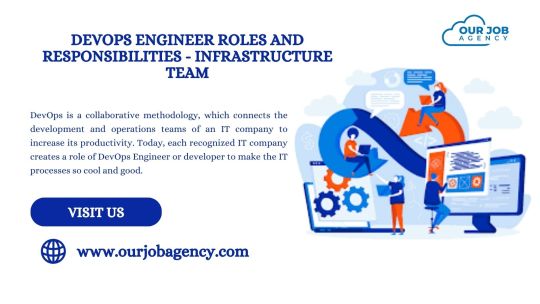
DevOps is a collaborative methodology, which connects the development and operations teams of an IT company to increase its productivity. Today, each recognized IT company creates a role of DevOps Engineer or developer to make the IT processes so cool and good.
#devops engineer roles and responsibilities#devops engineer role description#devops career path#devops engineer career path#apply devops engineer job#devops engineer job responsibility
0 notes
Text
The Roadmap to Full Stack Developer Proficiency: A Comprehensive Guide
Embarking on the journey to becoming a full stack developer is an exhilarating endeavor filled with growth and challenges. Whether you're taking your first steps or seeking to elevate your skills, understanding the path ahead is crucial. In this detailed roadmap, we'll outline the stages of mastering full stack development, exploring essential milestones, competencies, and strategies to guide you through this enriching career journey.

Beginning the Journey: Novice Phase (0-6 Months)
As a novice, you're entering the realm of programming with a fresh perspective and eagerness to learn. This initial phase sets the groundwork for your progression as a full stack developer.
Grasping Programming Fundamentals:
Your journey commences with grasping the foundational elements of programming languages like HTML, CSS, and JavaScript. These are the cornerstone of web development and are essential for crafting dynamic and interactive web applications.
Familiarizing with Basic Data Structures and Algorithms:
To develop proficiency in programming, understanding fundamental data structures such as arrays, objects, and linked lists, along with algorithms like sorting and searching, is imperative. These concepts form the backbone of problem-solving in software development.
Exploring Essential Web Development Concepts:
During this phase, you'll delve into crucial web development concepts like client-server architecture, HTTP protocol, and the Document Object Model (DOM). Acquiring insights into the underlying mechanisms of web applications lays a strong foundation for tackling more intricate projects.
Advancing Forward: Intermediate Stage (6 Months - 2 Years)
As you progress beyond the basics, you'll transition into the intermediate stage, where you'll deepen your understanding and skills across various facets of full stack development.
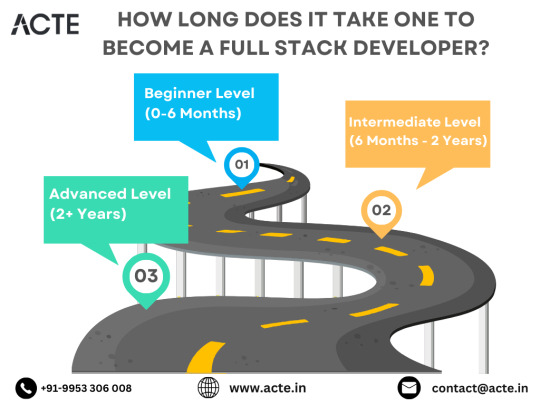
Venturing into Backend Development:
In the intermediate stage, you'll venture into backend development, honing your proficiency in server-side languages like Node.js, Python, or Java. Here, you'll learn to construct robust server-side applications, manage data storage and retrieval, and implement authentication and authorization mechanisms.
Mastering Database Management:
A pivotal aspect of backend development is comprehending databases. You'll delve into relational databases like MySQL and PostgreSQL, as well as NoSQL databases like MongoDB. Proficiency in database management systems and design principles enables the creation of scalable and efficient applications.
Exploring Frontend Frameworks and Libraries:
In addition to backend development, you'll deepen your expertise in frontend technologies. You'll explore prominent frameworks and libraries such as React, Angular, or Vue.js, streamlining the creation of interactive and responsive user interfaces.
Learning Version Control with Git:
Version control is indispensable for collaborative software development. During this phase, you'll familiarize yourself with Git, a distributed version control system, to manage your codebase, track changes, and collaborate effectively with fellow developers.
Achieving Mastery: Advanced Phase (2+ Years)
As you ascend in your journey, you'll enter the advanced phase of full stack development, where you'll refine your skills, tackle intricate challenges, and delve into specialized domains of interest.
Designing Scalable Systems:
In the advanced stage, focus shifts to designing scalable systems capable of managing substantial volumes of traffic and data. You'll explore design patterns, scalability methodologies, and cloud computing platforms like AWS, Azure, or Google Cloud.
Embracing DevOps Practices:
DevOps practices play a pivotal role in contemporary software development. You'll delve into continuous integration and continuous deployment (CI/CD) pipelines, infrastructure as code (IaC), and containerization technologies such as Docker and Kubernetes.
Specializing in Niche Areas:
With experience, you may opt to specialize in specific domains of full stack development, whether it's frontend or backend development, mobile app development, or DevOps. Specialization enables you to deepen your expertise and pursue career avenues aligned with your passions and strengths.
Conclusion:
Becoming a proficient full stack developer is a transformative journey that demands dedication, resilience, and perpetual learning. By following the roadmap outlined in this guide and maintaining a curious and adaptable mindset, you'll navigate the complexities and opportunities inherent in the realm of full stack development. Remember, mastery isn't merely about acquiring technical skills but also about fostering collaboration, embracing innovation, and contributing meaningfully to the ever-evolving landscape of technology.
#full stack developer#education#information#full stack web development#front end development#frameworks#web development#backend#full stack developer course#technology
10 notes
·
View notes
Text
Full Stack Testing vs. Full Stack Development: What’s the Difference?

In today’s fast-evolving tech world, buzzwords like Full Stack Development and Full Stack Testing have gained immense popularity. Both roles are vital in the software lifecycle, but they serve very different purposes. Whether you’re a beginner exploring your career options or a professional looking to expand your skills, understanding the differences between Full Stack Testing and Full Stack Development is crucial. Let’s dive into what makes these two roles unique!
What Is Full Stack Development?
Full Stack Development refers to the ability to build an entire software application – from the user interface to the backend logic – using a wide range of tools and technologies. A Full Stack Developer is proficient in both front-end (user-facing) and back-end (server-side) development.
Key Responsibilities of a Full Stack Developer:
Front-End Development: Building the user interface using tools like HTML, CSS, JavaScript, React, or Angular.
Back-End Development: Creating server-side logic using languages like Node.js, Python, Java, or PHP.
Database Management: Handling databases such as MySQL, MongoDB, or PostgreSQL.
API Integration: Connecting applications through RESTful or GraphQL APIs.
Version Control: Using tools like Git for collaborative development.
Skills Required for Full Stack Development:
Proficiency in programming languages (JavaScript, Python, Java, etc.)
Knowledge of web frameworks (React, Django, etc.)
Experience with databases and cloud platforms
Understanding of DevOps tools
In short, a Full Stack Developer handles everything from designing the UI to writing server-side code, ensuring the software runs smoothly.
What Is Full Stack Testing?
Full Stack Testing is all about ensuring quality at every stage of the software development lifecycle. A Full Stack Tester is responsible for testing applications across multiple layers – from front-end UI testing to back-end database validation – ensuring a seamless user experience. They blend manual and automation testing skills to detect issues early and prevent software failures.
Key Responsibilities of a Full Stack Tester:
UI Testing: Ensuring the application looks and behaves correctly on the front end.
API Testing: Validating data flow and communication between services.
Database Testing: Verifying data integrity and backend operations.
Performance Testing: Ensuring the application performs well under load using tools like JMeter.
Automation Testing: Automating repetitive tests with tools like Selenium or Cypress.
Security Testing: Identifying vulnerabilities to prevent cyber-attacks.
Skills Required for Full Stack Testing:
Knowledge of testing tools like Selenium, Postman, JMeter, or TOSCA
Proficiency in both manual and automation testing
Understanding of test frameworks like TestNG or Cucumber
Familiarity with Agile and DevOps practices
Basic knowledge of programming for writing test scripts
A Full Stack Tester plays a critical role in identifying bugs early in the development process and ensuring the software functions flawlessly.
Which Career Path Should You Choose?
The choice between Full Stack Development and Full Stack Testing depends on your interests and strengths:
Choose Full Stack Development if you love coding, creating interfaces, and building software solutions from scratch. This role is ideal for those who enjoy developing creative products and working with both front-end and back-end technologies.
Choose Full Stack Testing if you have a keen eye for detail and enjoy problem-solving by finding bugs and ensuring software quality. If you love automation, performance testing, and working with multiple testing tools, Full Stack Testing is the right path.
Why Both Roles Are Essential :
Both Full Stack Developers and Full Stack Testers are integral to software development. While developers focus on creating functional features, testers ensure that everything runs smoothly and meets user expectations. In an Agile or DevOps environment, these roles often overlap, with testers and developers working closely to deliver high-quality software in shorter cycles.
Final Thoughts :
Whether you opt for Full Stack Testing or Full Stack Development, both fields offer exciting opportunities with tremendous growth potential. With software becoming increasingly complex, the demand for skilled developers and testers is higher than ever.
At TestoMeter Pvt. Ltd., we provide comprehensive training in both Full Stack Development and Full Stack Testing to help you build a future-proof career. Whether you want to build software or ensure its quality, we’ve got the perfect course for you.
Ready to take the next step? Explore our Full Stack courses today and start your journey toward a successful IT career!
This blog not only provides a crisp comparison but also encourages potential students to explore both career paths with TestoMeter.
For more Details :
Interested in kick-starting your Software Developer/Software Tester career? Contact us today or Visit our website for course details, success stories, and more!
🌐visit - https://www.testometer.co.in/
2 notes
·
View notes
Text
Top Courses for Aspiring Developers: Elevate Your Skills and Career
Nowadays everyone wants to enhance their skills and career. Everyone wants to improve their skills and take their career forward. You want to improve their skill and take your software development career to the next level.
Today’s tech-driven world, aspiring developers are in high demand. Here’s a guide to some of the top courses designed to elevate your skills and boost your career prospects in the field of software development. Developers use web development languages to help create dynamic web pages. The most common coding languages include Javascript, Python and C. we must constantly update our skills. We should assume good skills that will take our career forward. In this article, we will suggest courses that can help to make software developers.
1. Full-Stack Web Development
This course covers everything from front-end technologies like HTML, CSS, and JavaScript to back-end development with Node.js and Express. It’s ideal for those who want to become proficient in both client and server-side programming.
2. Data Science and Machine Learning
This specialization includes courses on machine learning, data mining, and data analysis. It provides a deep dive into algorithms, statistical methods, and practical applications.
3. Cloud Computing
This course prepares you for the AWS Certified Solutions Architect exam. It covers designing distributed systems, deploying scalable applications, and working with AWS services.
4. Mobile App Development
This series of courses is designed for aspiring iOS developers. It covers Swift programming, user interface design, and app development practices.
5. Cybersecurity
This specialization covers essential cybersecurity concepts, including risk management, cryptography, and network security. It’s designed for those interested in protecting systems and data.
6. Game Development
This specialization covers game design principles, development processes, and interactive media creation. It includes courses on Unity and Unreal Engine, two of the most popular game development platforms.
7. Software Engineering
This course provides a comprehensive overview of software engineering principles, including design patterns, testing, and project management.
8. DevOps
This course introduces key DevOps concepts such as continuous integration, continuous delivery, and infrastructure as code. It’s ideal for developers looking to improve collaboration between development and operations.
By identifying the right courses and doing those courses, we can follow the path of success. As you consider the courses to take, we should do the courses in which we are interest.
Top Courses for Aspiring Developers: Elevate Your Skills and Career
Nowadays everyone wants to enhance their skills and career. Everyone wants to improve their skills and take their career forward. You want to improve their skill and take your software development career to the next level.
Today’s tech-driven world, aspiring developers are in high demand. Here’s a guide to some of the top courses designed to elevate your skills and boost your career prospects in the field of software development. Developers use web development languages to help create dynamic web pages. The most common coding languages include Javascript, Python and C. we must constantly update our skills. We should assume good skills that will take our career forward. In this article, we will suggest courses that can help to make software developers.
1. Full-Stack Web Development
This course covers everything from front-end technologies like HTML, CSS, and JavaScript to back-end development with Node.js and Express. It’s ideal for those who want to become proficient in both client and server-side programming.
2. Data Science and Machine Learning
This specialization includes courses on machine learning, data mining, and data analysis. It provides a deep dive into algorithms, statistical methods, and practical applications.
3. Cloud Computing
This course prepares you for the AWS Certified Solutions Architect exam. It covers designing distributed systems, deploying scalable applications, and working with AWS services.
4. Mobile App Development
This series of courses is designed for aspiring iOS developers. It covers Swift programming, user interface design, and app development practices.
5. Cybersecurity
This specialization covers essential cybersecurity concepts, including risk management, cryptography, and network security. It’s designed for those interested in protecting systems and data.
6. Game Development
This specialization covers game design principles, development processes, and interactive media creation. It includes courses on Unity and Unreal Engine, two of the most popular game development platforms.
7. Software Engineering
This course provides a comprehensive overview of software engineering principles, including design patterns, testing, and project management.
8. DevOps
This course introduces key DevOps concepts such as continuous integration, continuous delivery, and infrastructure as code. It’s ideal for developers looking to improve collaboration between development and operations.
By identifying the right courses and doing those courses, we can follow the path of success. As you consider the courses to take, we should do the courses in which we are interest.
2 notes
·
View notes
Text
Mastering DevOps: A Path to Tech Leadership and Innovation
In the ever-evolving landscape of technology, DevOps stands out as an indicator of innovation and efficiency. As we navigate the digital age, the role of DevOps, which seamlessly blends development and operations practices, has become increasingly important. It not only accelerates software delivery but also promotes collaboration, enhances automation, and ensures the delivery of high-quality applications. If you're considering a career in tech, DevOps is an enticing and promising option. In this comprehensive exploration, we'll dive deep into the world of DevOps careers, unveiling the manifold opportunities, challenges, and avenues for growth that it offers.
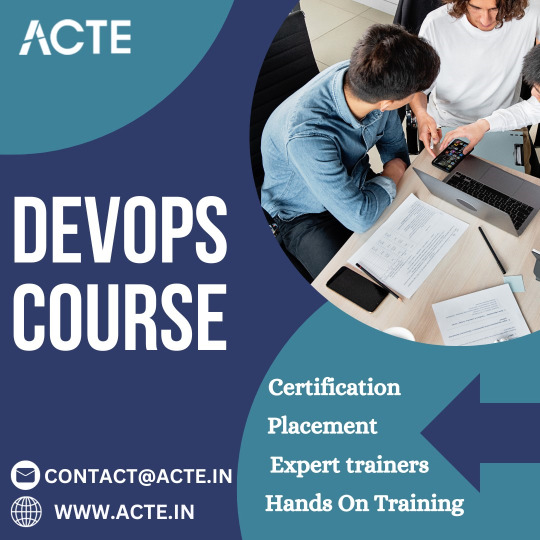
Why DevOps? The Irresistible Appeal
1. High Demand for DevOps Professionals
In a world where businesses are constantly striving for efficiency and agility, DevOps professionals are in high demand. Organizations of all sizes, from startups to Fortune 500 giants, recognize the value of DevOps in streamlining development processes, enhancing automation, and improving collaboration among cross-functional teams. This demand translates into a plethora of job opportunities for DevOps experts.
2. Competitive Salaries
In the realm of tech careers, compensation is often a significant factor. DevOps practitioners frequently enjoy competitive salaries, and experienced DevOps engineers, in particular, are handsomely rewarded. This makes DevOps not only a fulfilling career but also a financially rewarding one.
3. Versatility Across Industries
One of the striking features of a DevOps career is its versatility. DevOps skills are transferable across various industries, including finance, healthcare, e-commerce, and more. The fundamental principles and tools of DevOps are universally applicable, allowing you to explore different sectors while leveraging your expertise.
4. Continuous Learning and Adaptation
The tech world thrives on change, and DevOps is no exception. This dynamic field continuously evolves with the emergence of new tools and practices. Staying updated with the latest trends and technologies is not just a requirement but a thrilling aspect of a DevOps career. The pursuit of knowledge and adaptation are ingrained in the DevOps culture.
5. Enhanced Efficiency Through Automation
At the core of DevOps lies the principle of automation. DevOps practices emphasize automating manual processes, reducing errors, and accelerating deployment cycles. The result is enhanced efficiency in development pipelines, enabling teams to deliver software faster and with higher quality.
6. Collaboration as a Core Value
DevOps promotes collaboration and communication between traditionally siloed teams, such as development and operations. This cultural shift towards teamwork and shared responsibilities fosters a more inclusive and productive workplace environment.
7. A Path to Leadership
A DevOps career is not just about technical skills; it's also a pathway to leadership positions. As you gain experience and expertise, you'll find yourself well-equipped to step into roles like DevOps manager, architect, or consultant, where you can influence and shape the DevOps practices of your organization.
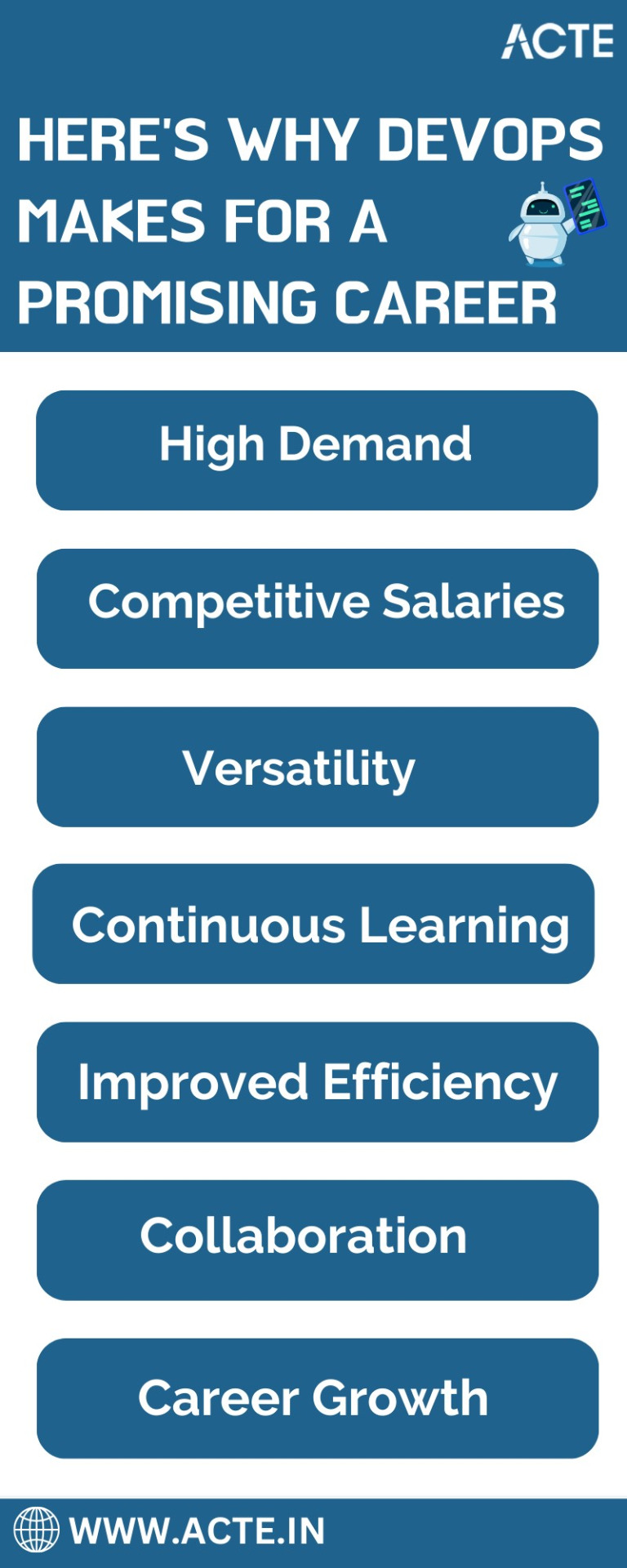
The Future of DevOps: A World of Innovation
As we peer into the future, the DevOps landscape promises even more exciting developments:
1. Advanced Automation and AI
Automation will continue to be a driving force in DevOps, with artificial intelligence (AI) playing a more significant role. AI-powered tools will enhance predictive analytics, optimize resource allocation, and further reduce manual intervention in the software development lifecycle.
2. DevOps in Edge Computing
The rise of edge computing, driven by the Internet of Things (IoT), presents new challenges and opportunities for DevOps. DevOps practices will expand to accommodate the unique demands of edge environments, enabling real-time data processing and analysis at the edge of the network.
3. Security-First DevOps
With cybersecurity concerns on the rise, DevOps will place an even greater emphasis on security practices. DevSecOps, the integration of security into the DevOps pipeline, will become standard practice, ensuring that security is not an afterthought but an integral part of the development process.
4. Hybrid and Multi-Cloud DevOps
Hybrid and multi-cloud environments are becoming increasingly prevalent. DevOps will continue to evolve to seamlessly integrate on-premises and cloud resources, providing organizations with the flexibility to choose the best infrastructure for their needs.
5. DevOps as a Service
DevOps as a Service (DaaS) is gaining traction. Organizations will increasingly turn to third-party providers for DevOps solutions, allowing them to focus on their core competencies while leveraging the expertise of specialized DevOps teams.
In a world driven by technology, a career in DevOps offers an exciting journey filled with opportunities for growth and innovation. Whether you're just starting your career or looking to make a transition, DevOps holds the promise of a rewarding path.
To embark on this journey, it's essential to equip yourself with the right skills and knowledge. ACTE Technologies, a renowned provider of DevOps training and certification programs, stands ready to be your guiding light. Their expert-led courses can help you build a complex foundation in DevOps principles, master the relevant tools, and stay ahead in this ever-evolving field.
So, embrace the future of technology with a career in DevOps, and let ACTE Technologies be your trusted companion on the road to excellence. As you explore the endless possibilities of DevOps careers, may your passion for innovation and your commitment to continuous learning lead you to success and fulfillment.
11 notes
·
View notes
Text
AWS DevOps Careers: Navigating the Cloud-Infused Professional Landscape
In the rapidly evolving tech terrain, the confluence of AWS and DevOps has given rise to a dynamic realm, promising an array of career prospects. This all-encompassing guide unveils the diverse roles and responsibilities within AWS DevOps, offering insights into the multifaceted career avenues that await proficient individuals.
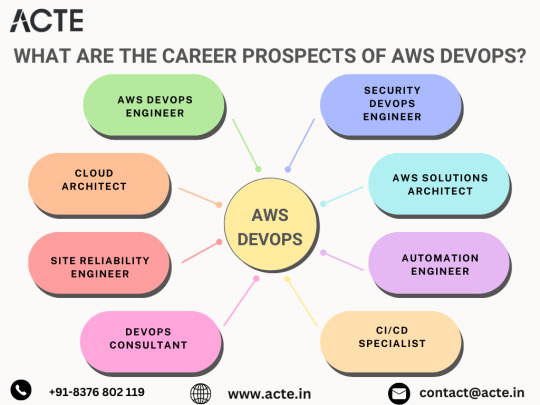
1. Crafting Cloud Solutions: The Role of an AWS DevOps Engineer
Overview: AWS DevOps Engineers serve as architects of automated software development, leveraging AWS cloud services.
Responsibilities: Dive into Infrastructure as Code (IaC), fine-tune AWS tools, and champion the principles of Continuous Integration/Continuous Deployment (CI/CD).
2. Architecting Scalable Cloud Solutions: The Realm of Cloud Architects
Overview: Cloud Architects design scalable and reliable cloud infrastructure on AWS, seamlessly aligning with DevOps principles.
Responsibilities: Collaborate to optimize AWS services, ensuring a resilient and scalable cloud environment.
3. Reliability in the Cloud: The Role of a Site Reliability Engineer (SRE)
Overview: SREs focus on ensuring system reliability, availability, and performance on AWS through vigilant monitoring and automation.
Responsibilities: Implement automation strategies, monitor AWS resources, and respond adeptly to incidents.
4. DevOps Consultancy: Guiding Organizations to DevOps Excellence
Overview: DevOps Consultants provide expertise in implementing DevOps practices, specializing in AWS services.
Responsibilities: Offer guidance on best practices, implement CI/CD pipelines, and optimize workflows using AWS tools.
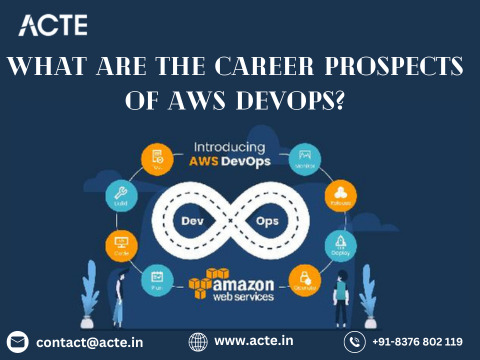
5. Embedding Security into DevOps: The Role of a Security DevOps Engineer (DevSecOps)
Overview: DevSecOps Engineers integrate security practices into the AWS DevOps pipeline.
Responsibilities: Implement robust security measures, conduct risk assessments, and ensure compliance with security policies.
6. Solutions Architecture on AWS: Crafting Business-Aligned Solutions
Overview: AWS Solutions Architects design and implement solutions aligned with business requirements, utilizing AWS services.
Responsibilities: Collaborate across teams, grasp project intricacies, and architect solutions that optimize AWS resources.
7. Scripting the Future: The Role of an Automation Engineer in AWS
Overview: Automation Engineers script and automate processes within AWS DevOps.
Responsibilities: Script infrastructure deployment, automate testing processes, and lead AWS automation initiatives.
8. Streamlining Software Delivery: The Role of a CI/CD Specialist on AWS
Overview: CI/CD Specialists optimize and streamline the software delivery pipeline within the AWS environment.
Responsibilities: Configure and manage CI/CD tools, ensuring the efficient and reliable delivery of software.
Embarking on an AWS DevOps career journey presents professionals with a landscape rich in challenges and opportunities. Each role within AWS DevOps contributes to a fulfilling and dynamic career trajectory, promising innovation and significant contributions to the ever-evolving technological realm. Best of luck as you navigate the transformative path of AWS DevOps careers!
2 notes
·
View notes
Text
Navigating the Future: Thriving in Automation Testing Careers
In the dynamic landscape of technology, the future of automation testing emerges as a strategic and rewarding career choice, offering enduring prospects and continuous evolution. Here's a deep dive into why automation testing is not just a profession but a journey towards a future filled with opportunities and advancements.

1. Pioneering Technological Evolution: Positioned at the forefront of technological advancements, automation testing serves as a trailblazer, ensuring seamless adaptation to emerging technologies and future innovations.
2. Anchored in Agile and DevOps Realms: The widespread embrace of Agile and DevOps methodologies propels automation testing to the forefront. In an era demanding rapid software releases, automation testing becomes the linchpin for maintaining speed and reliability in development cycles.
3. Surging Demand for Quality Assurance: The escalating complexity of modern software necessitates robust quality assurance processes. Automation testing provides a systematic and efficient approach, meeting the rising demand for top-tier quality in software applications.
4. Efficiency Unleashed: A standout advantage of automation testing lies in its prowess to significantly reduce testing time and costs. Rapid and repetitive execution of automated tests enables efficient bug identification, ensuring swift development cycles.
5. Cross-Industry Versatility: The adaptability of automation testing transcends industry boundaries. Professionals can explore diverse opportunities across sectors like healthcare, finance, e-commerce, and gaming, opening up a spectrum of career avenues beyond conventional limits.
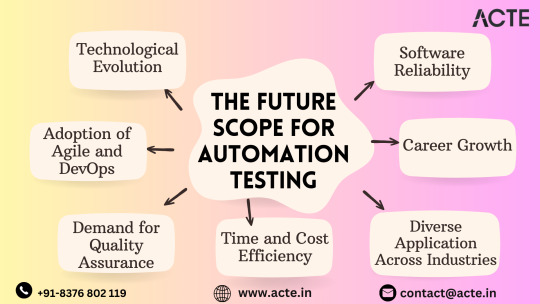
6. Skills Cultivation and Career Ascension: Opting for a career in automation testing provides an enriching environment for skill development. Mastery of automation tools, programming languages, and staying abreast of industry trends pave the way for substantial career growth. Roles such as automation test engineer, test architect, or quality assurance manager showcase the diverse career paths within reach.
7. Fostering Software Reliability: At the core of automation testing is its pivotal role in ensuring the reliability and performance of software applications. Early identification and resolution of issues in the development process contribute to delivering high-quality software products to end-users.
In conclusion, the future of automation testing is a voyage—an exploration of opportunities and advancements. For individuals with a tech-savvy mindset, attention to detail, and a commitment to software quality, choosing a career in automation testing is a forward-thinking and fulfilling decision. As the industry continues to pivot towards automated testing solutions, it remains a field of enduring relevance, promising a future rich with opportunities and impact.
3 notes
·
View notes
Text
Crafting a Career Odyssey: AWS Certification Unveiled for Solution Architects
Embarking on the journey of AWS certification as a Solution Architect unveils a plethora of career avenues, transforming your professional trajectory in the dynamic landscape of cloud computing. Let's explore the myriad paths that unfold for certified AWS Solution Architects:
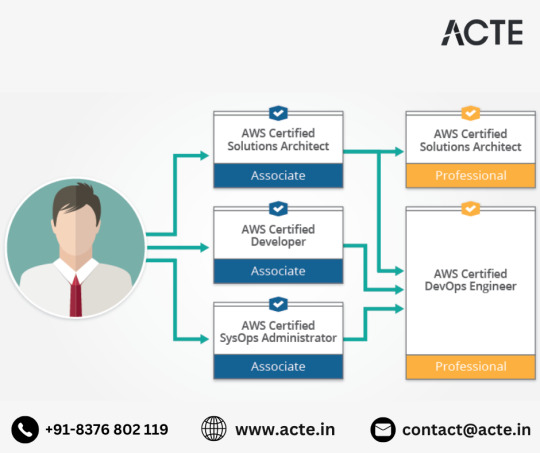
1. Architecting Excellence: Steering Digital Transformations AWS certification catapults you into roles where you architect and implement cutting-edge solutions. As a linchpin in digital transformations, you play a pivotal role in creating scalable, secure, and cost-effective solutions aligned with organizational objectives.
2. Cloud Architect Mastery: Orchestrating Comprehensive Cloud Strategies The journey doesn't stop at Solution Architect; it seamlessly transitions into broader Cloud Architect roles. Here, you orchestrate end-to-end cloud strategies, ensuring optimal performance, security, and efficiency in cloud-based environments.
3. Enterprise Architect Pinnacle: Shaping Holistic IT Strategies With AWS certification, the pathway extends to Enterprise Architect roles. This involves shaping the overarching IT strategy, aligning technology solutions with business goals, and ensuring seamless integration across the enterprise.
4. Cloud Consulting Expertise: Guiding Clients on Cloud Journey Organizations seek AWS-certified Solution Architects for Cloud Consultant positions, where you provide guidance on cloud strategies, migration plans, and optimize AWS infrastructure for enhanced performance.
5. Technical Leadership Zenith: Guiding Development Initiatives Expertise gained through AWS certification positions you favorably for technical leadership roles. Leading teams, guiding development projects, and offering strategic input on technology initiatives become part of your purview.
6. DevOps Alchemy: Bridging Development and Operations The fusion of AWS expertise and Solution Architect skills opens doors to DevOps Engineer opportunities. Your grasp of cloud infrastructure proves invaluable in optimizing continuous integration and deployment pipelines.
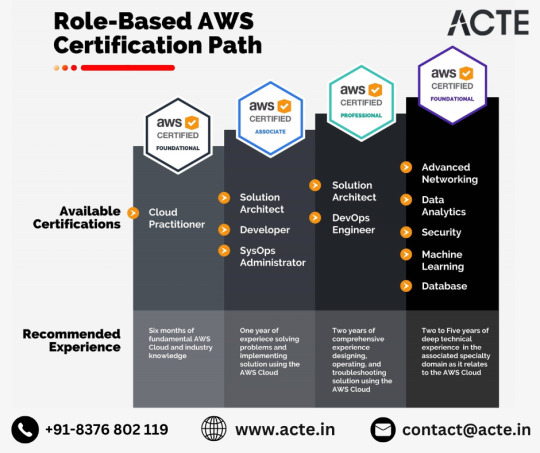
7. Pre-Sales Artistry: Crafting Compelling Solutions Leverage AWS certification in Pre-Sales Solutions Architect positions. Engaging with clients during the pre-sales phase, you become instrumental in understanding their needs and crafting compelling solutions.
8. Specialized Architectural Prowess: Exploring Niche Opportunities As technology evolves, specialized Solution Architect roles emerge. Depending on your interests and the evolving AWS service landscape, opportunities in areas like AI/ML architecture, IoT solutions, or serverless architectures beckon.
9. Entrepreneurial Odyssey: Beyond Conventional Paths Armed with AWS certification, entrepreneurial pursuits become viable. Whether offering specialized AWS services or launching a tech startup, the certification serves as a foundation for innovative endeavors.
10. Lifelong Learning Odyssey: Staying Ahead in the Dynamic AWS Realm The AWS ecosystem is dynamic, with constant updates and new services. Your certification journey becomes a springboard for continuous learning and professional development, ensuring you remain at the forefront of cloud technology.
In conclusion, AWS certification for Solution Architects is not just a validation; it's a compass guiding you through a rich tapestry of career possibilities. Whether crafting digital landscapes, steering enterprises through the cloud, or exploring niche opportunities, the certification becomes a catalyst for continuous growth, learning, and innovation in the ever-evolving cloud computing domain.
2 notes
·
View notes